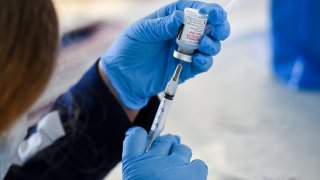
- The FDA told CNBC this week the agency is conducting its review of Moderna's vaccine for adolescents as quickly as possible.
- Some countries have reported slightly higher rates of heart inflammation after Moderna's vaccine than Pfizer's, though the overall risk is low.
- Covid-19 carries a much higher risk of myocarditis than vaccination, researchers have found.
- The CDC's committee of vaccine experts is meeting Friday to review the latest data on myocarditis.
For months, the authorization of Moderna's Covid-19 vaccine for teenagers has been on hold as the Food and Drug Administration reviews the risk of a rare but serious form of heart inflammation that's affected mostly young men who got the company or Pfizer's shots.
WATCH ANYTIME FOR FREE
Stream NBC10 Boston news for free, 24/7, wherever you are. |
Moderna applied for emergency approval of its Covid vaccine for 12- to 17-year-olds in June, but the FDA told the company in October that its review of the vaccine for kids wouldn't be finished before January.
The agency said it needed more time to examine the risk of myocarditis in vaccines based on mRNA technology, which is used in both company's shots. The FDA, in a statement to CNBC on Wednesday, said it is conducting the review as fast as possible, but it cannot predict how long the evaluation will take. The review is intended to ensure the benefits of the vaccine outweigh the risks in adolescents, the agency said.
Get updates on what's happening in Boston to your inbox. Sign up for our News Headlines newsletter.
Messenger RNA, or mRNA vaccines, use genetic code to teach cells how to make a protein that triggers an immune response if someone gets infected with a virus. Traditional vaccines, like Johnson and Johnson's, put inactivate germs into our bodies.
The FDA granted full approval for Moderna's two-dose vaccine for adults on Monday, and the Centers for Disease Control and Prevention is expected to soon give its final OK. The CDC's committee of vaccine experts is meeting Friday to review the latest data on on myocarditis in teens and adults.
Money Report
October
Moderna said in October it would wait to ask the FDA to authorize its vaccine for 6- to 11-year-olds until the shot for teenagers gets the green light. The company expects to publish data on its vaccine for kids 2 to 5 years old in March.
Myocarditis is an inflammation of the heart muscle that can lead to serious health problems, according to the National, Heart Lung and Blood Institute. Viral infections are the most common cause of myocarditis. People are much more likely to develop myocarditis from Covid than the vaccines, and the risk to the heart can be more severe, according to the Department of Health and Human Services.
The risk of myocarditis from Covid is 100 times higher than developing the condition after vaccination, according to a recent paper in Nature Reviews Cardiology. Depending on the study, the risk of dying from Covid associated myocarditis is between 20% and 70%, while the risk of death from myocarditis due to vaccination is less than 1%, according to the paper.
Dr. Jose Romero, the former chairman of the CDC's independent committee of vaccine experts, said myocarditis associated with vaccination is generally mild and resolves quickly.
Myocarditis from Covid
"Whereas with myocarditis due to Covid, it's more severe, it lasts longer, and the mortality rate can be significant," said Romero, who serves as the secretary of health in Arkansas.
Children are more likely to suffer from multisystem inflammatory syndrome, which is known as MIS-C, after contracting Covid than vaccine-induced myocarditis. More than 6,000 children have developed MIS-C since the pandemic began. MIS-C often impacts the heart, and it can lead to myocarditis and other cardiac complications. At least 55 children have died from MIS-C, according to the CDC.
Dr. Matthew Oster, a pediatric cardiologist at Children's Healthcare of Atlanta, said MIS-C is much more common and children get much sicker from it than myocarditis after vaccination. Children's of Atlanta has had 13 kids admitted with myocarditis after the vaccine as compared with more than 400 children admitted with MIS-C, Oster said.
"We have more than half of them requiring ICU stays," Oster, director of Children's Cardiac Outcomes Research Program, said about children admitted with MIS-C. "We have more than half of them requiring ICU stays. That is much more common and much more severe than the myocarditis from vaccination."
French and Nordic studies
Moderna's vaccine for adolescents came under closer scrutiny in the fall. French and Nordic studies both found an increased incidence of myocarditis after a second dose of Moderna's vaccine among adolescent and young adult males than after Pfizer's according to the European Medicines Agency. However, the European Union's top drug agency said the benefit of both vaccines outweighs the risks because myocarditis as a side effect is rare. Sweden and other northern European countries restricted the use of Moderna's shots for young people in October. Canada also identified a higher risk.
Moderna said in October that the company had not observed an increased risk of myocarditis in people younger than 18 years old. However, the company said it is conducting its own review of external data and is committed to working closely with the FDA to support the agency's evaluation. Romero said the FDA made the right call to wait and get as much data as possible before making any decisions.
When Moderna asked the FDA to lower the eligibility age for its vaccine to youths 12 to 17 years old in early June, the CDC began to receive reports of myocarditis in young males who had received Pfizer's vaccine. The CDC had just recommended Pfizer's shot for 12- to 15-year-olds in May. Pfizer and Moderna's shots both use mRNA technology.
Link to mRNA vaccines
The CDC's independent committee of vaccine experts, which met in June, found a link between the myocarditis and the mRNA vaccines They, however, concluded that the benefits of the shots outweighed the rare risks and reiterated its recommendation that children 12 to 15 years old should get Pfizer's vaccine.
Romero, who chaired the committee at the time, said it was clear the Pfizer vaccine prevented a significant number of infections, hospitalizations and intensive care admissions, while the risk from myocarditis was relatively low.
Myocarditis normally occurs within a week after the second dose of an mRNA vaccine, according to the CDC. Symptoms reported by patients include chest pain, shortness of breath and a feeling that their heart is fluttering.
A recent study published in the Journal of the American Medical Association found that 96% of more than 800 cases of people under 30 who developed myocarditis after vaccination were hospitalized, but the overwhelming majority of them recovered and were discharged. The data is based on 1,626 myocarditis cases reported to a CDC and FDA database from December 2020 to August.
Short hospital stays
Oster, one of the authors on the study, said the hospital stays were short and children often recovered after just taking pain medication.
"We do recommend that those who have it, refrain from vigorous physical activity for a period of a few months, just to make sure the heart has a full recovery, but what we're seeing is that people are getting better and so far the long-term outcomes looked good," Oster said.
Boys ages 16 to 17 reported the highest rates of myocarditis after a second dose of Pfizer's vaccine, about 106 per 1 million shots administered, while boys 12 to 15 reported 71 cases per million doses administered, according to the study. Oster said traditional myocarditis is also higher in male teenagers.
Researchers are still investigating what triggers myocarditis after vaccination, with many scientists theorizing that testosterone may play a role. Though Pfizer and Moderna are both two-dose vaccines, Pfizer's 30-microgram dosage for everyone older than 12 is lower than the 100-microgram dosage that Moderna uses for adolescents. However, Romero cautioned against drawing conclusions based on the dosing of the two mRNA vaccines because they have other differences. They use different fatty bubbles, for example, to deliver the mRNA material to cells, which then start producing the proteins that induce an immune response to protect against the virus.
Dr. Sean O'Leary, vice chair of the American Academy of Pediatrics' committee on infectious disease, said parents should know that decisions they take every day, such as driving, are higher risk than their child developing myocarditis after vaccination. And the risk of disease from Covid is much higher than the risk of the vaccine, he said.






